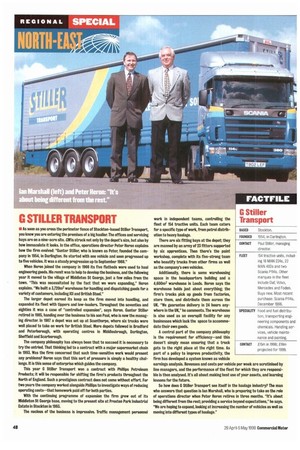G STILLER TRANSPORT
Page 50

If you've noticed an error in this article please click here to report it so we can fix it.
MI As soon as you cross the perimeter fence of Stockton-based Stiller Transport, you know you are entering the premises of a big haulier. The offices and servicing bays are on a nine-acre site. CMis struck not only by the depot's size, but also by how immaculate it looks. In the office, operations director Peter Heron explains how the firm evolved: "Gunter Stiller, who is known as Peter, founded the company in 1954, in Darlington. He started with one vehicle and soon progressed up to five vehicles. It was a steady progression up to September 1966."
When Heron joined the company in 1966 its five flatbeds were used to haul engineering goods. His remit was to help to develop the business, and the following year it moved to the village of Middleton St George, just a few miles from the town. This was necessitated by the fact that we were expanding," Heron explains. "We built a 3.720m2 warehouse for handling and dispatching goods for a variety of customers, including ICI and British Steel."
The larger depot earned its keep as the firm moved into handling, and expanded its fleet with tippers and low-loaders. Throughout the seventies and eighties it was a case of "controlled expansion". says Heron. Gunter Stiller retired in 1985, handing over the business to his son Paul. who is now the managing director. In 1987 a depot was set up at Scunthorpe. where six trucks were well placed to take on work for British Steel. More depots followed in Bradford and Peterborough. with operating centres in Middlesbrough, Darlington, Sheffield and Scarborough.
The company philosophy has always been that to succeed it is necessary to try the untried. That thinking led to a contract with a major supermarket chain in 1993. Was the firm concerned that such time-sensitive work would present any problems? Heron says that this sort of pressure is simply a healthy challenge. It is this sense of enterprise which guides the company, This year G Stiller Transport won a contract with Phillips Petroleum Products; it will be responsible for shifting the firm's products throughout the North of England. Such a prestigious contract does not come without effort. for two years the company worked alongside Phillips to investigate ways of reducing operating costs—that homework paid off for both parties.
With the continuing programme of expansion the firm grew out of its Middleton St George base, moving to the present site at Preston Park Industrial Estate in Stockton in 1993.
The nucleus of the business is impressive. Traffic management personnel work in independent teams, controlling the fleet of 154 tractive units. Each team caters for a specific type of work, from petrol distribution to heavy haulage.
There are six fitting bays at the depot; they are manned by an army of 23 fitters supported by six apprentices. Then there's the paint workshop, complete with its five-strong team who beautify trucks from other firms as well as the company's own vehicles.
Additionally, there is some warehousing space in the headquarters building and a 4.600m2 warehouse in Leeds. Heron says the warehouse holds just about everything; the firm's trucks pick up goods from factories, store them, and distribute them across the UK, "We guarantee delivery in 24 hours anywhere in the UK," he comments. The warehouse is also used as an overspill facility for any businesses which lack the space to accommodate their own goads. CONTACT £15m in 1998; £18n1
projected fon 1999. A central part of the company philosophy is the requirement for efficiency—and this doesn't simply mean ensuring that a truck gets to the right place at the right time. As part of a policy to improve productivity, the firm has developed a system known as vehicle earnings analysis. Revenues and costs per vehicle per week are scrutinised by line managers, and the performance of the fleet for which they are responsi So how does G Stiller Transport see itself in the haulage industry? The man who answers that question is Ian Marshall, who is preparing to take on the role of operations director when Peter Heron retires in three months. "It's about being different from the rest; providing a service beyond expectations," he says. "We are hoping to expand, looking at increasing the number of vehicles as well as moving into different types of haulage."




















































































































